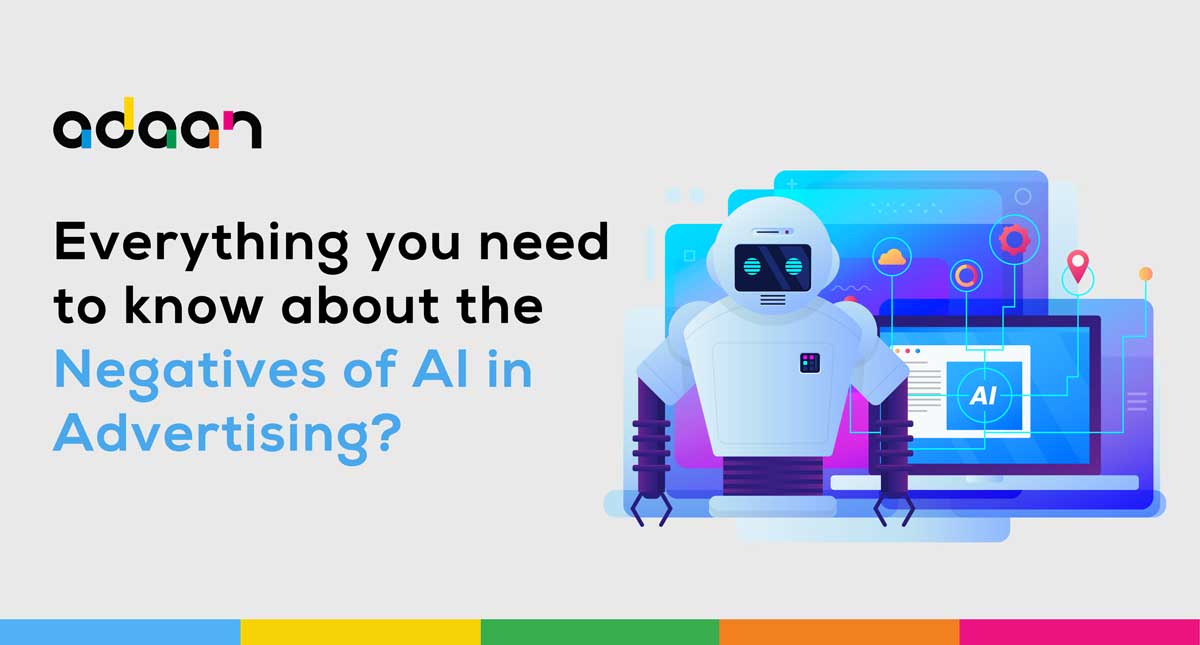Artificial intelligence (AI) has been hailed as the future of advertising and marketing, promising more efficient targeting, personalized experiences, and increased revenues. However, there is a darker side to AI in advertising that is often overlooked. As we witness the transformative potential of artificial intelligence (AI) in advertising. It’s lauded as the future, offering heightened efficiency in targeting, personalized experiences, and enhanced revenues. However, within our AI-centric perspective, we recognize the obscured challenges. As AI gains prominence, our concerns extend beyond the spotlight on privacy and ethics, delving into the intricate landscape of potential manipulations. This blog is a journey into the nuanced facets of AI in advertising, unraveling the risks and challenges that accompany the utilization of AI-powered solutions in the dynamic realm of marketing.
The rise of AI in advertising
The rise of AI in advertising has been nothing short of remarkable. With advancements in technology and the increasing availability of data, AI has become an integral part of many advertising strategies. From programmatic advertising to predictive analytics, AI has revolutionized the way ads are created, distributed, and optimized.
One of the major benefits of AI in advertising is its ability to target audiences with precision. By analyzing vast amounts of data, AI can identify the right audience for a particular product or service, ensuring that ads are shown to the people most likely to be interested in them. This not only improves the effectiveness of ads but also increases the return on investment for advertisers.
Nevertheless, the ascent of AI in advertising brings not only concerns about privacy and data protection but also anxieties over biases and inaccurate content. As AI algorithms sift through personal data, there is a potential risk of biased outcomes or dissemination of inaccurate information. This amplifies ethical considerations regarding responsible data collection and usage in advertising. Robust regulations are imperative not only for safeguarding consumers’ privacy but also for addressing the challenges posed by biases and inaccuracies in AI-driven advertising practices.
Furthermore, AI-powered advertising also poses the risk of manipulation. By utilizing AI algorithms, advertisers can create highly persuasive and personalized ads that can influence consumers’ thoughts, actions, and purchasing decisions. While this may be beneficial for advertisers, it raises questions about the potential for manipulation and the impact it can have on consumer freedom and autonomy.
The benefits of AI in advertising
1. Targeted and Personalized Advertising
AI empowers advertisers to deliver highly targeted and personalized ads to their intended audience. By harnessing AI algorithms, advertisers can analyze extensive consumer data, gaining insights into individual preferences, behaviors, and purchase patterns. This capability enables the creation of ads that resonate with consumers on a deeper level, significantly increasing the likelihood of conversion and maximizing return on investment.
2. Ad Optimization for Improved Performance
AI-powered ad optimization is pivotal in enhancing campaign performance. Through continuous real-time analysis of data, AI algorithms enable advertisers to make informed decisions regarding ad placements, formats, and bidding strategies. This results in more efficient and cost-effective ad campaigns, driving higher click-through rates, conversions, and, ultimately, increased revenue for advertisers.
3. Data-Driven Analytics and Reporting
AI-driven analytics and reporting provide advertisers with valuable metrics and insights into their advertising efforts. By automating the data collection and analysis process, AI simplifies the task of measuring campaign performance, understanding audience engagement, and identifying areas for improvement. This data-driven approach empowers advertisers to refine their strategies and make informed, data-backed decisions that drive better results.
4. Enhanced User Experience
AI contributes to an enhanced user experience by facilitating the delivery of relevant and timely content. Through advanced algorithms, advertisers can anticipate user needs, preferences, and behaviors, ensuring that ads are not only personalized but also aligned with the user’s interests. This creates a more engaging and user-friendly advertising experience.
5. Increased Efficiency in Ad Campaigns
The automation capabilities of AI streamline and optimize various aspects of ad campaigns. Tasks such as audience targeting, content creation, and performance analysis can be automated, saving time and resources. This increased efficiency allows advertisers to focus on strategy and creativity, fostering more innovative and impactful campaigns.
6. Predictive Analysis for Strategic Planning
AI’s predictive analysis capabilities empower advertisers to foresee trends and make informed decisions for strategic planning. By analyzing historical data and identifying patterns, AI assists advertisers in anticipating market shifts, consumer behaviors, and emerging opportunities. This foresight enables advertisers to stay ahead of the competition and adapt their strategies proactively.
In conclusion, the benefits of AI in advertising are extensive and transformative. Advertisers can leverage AI to create targeted, efficient, and data-driven campaigns that not only resonate with consumers but also drive measurable business outcomes. Embracing AI in advertising practices allows businesses to stay competitive in a dynamic and ever-evolving digital landscape.
The dark side of AI in advertising
1. Privacy Concerns and Ethical Implications
The increasing integration of AI in advertising raises profound privacy concerns and ethical considerations. As AI algorithms analyze vast amounts of consumer data, the risk of personal information misuse or exploitation becomes a paramount worry. Advertisers must take responsibility for secure and transparent data handling, ensuring consumers maintain control over how their data is collected and utilized.
2. Biases in AI Algorithms
A critical issue is the potential for biases within AI algorithms. If the training data used to develop these algorithms is biased or flawed, it can lead to discriminatory ad targeting or the exclusion of specific groups. Vigilant monitoring and addressing of biases are essential for advertisers, ensuring fair and inclusive advertising practices.
3. Manipulation of Consumer Behavior and Emotions
AI-powered algorithms possess the capability to manipulate consumer behavior and emotions, blurring the line between persuasion and manipulation. Advertisers must exercise caution in using AI to influence consumers, being mindful of the ethical implications and potential harm arising from manipulative advertising practices.
4. Lack of Creativity and Repetitive Content
Critics argue that while AI excels in data processing and targeting, it often falls short in delivering truly innovative and captivating campaigns. Striking a balance between data-driven efficiency and creative ingenuity becomes crucial to avoid formulaic, uninspired advertising and ensure authentic connections with diverse audiences.
5. AI-Generated Content Within Limited Knowledge
The emergence of AI-generated content within the confines of limited knowledge presents a growing concern. Advertisers face the challenge of discerning between authentic and AI-generated content, requiring heightened vigilance to combat the potential dissemination of misleading information. In a landscape where distinguishing real from fake becomes intricate, proactive measures are imperative to uphold trust in the advertising industry.
6. Privacy Concerns and Ethical Implications
Privacy concerns and ethical implications are at the forefront when it comes to the Negative of AI in advertising. With the increasing use of AI algorithms to analyze consumer data, the potential for privacy infringement is a significant concern. Advertisers must take the responsibility of handling data securely and transparently, ensuring that consumers have control over how their data is collected and used.
Given these risks, it is crucial for advertisers to approach AI in advertising with caution. Advertisers must prioritize ethical considerations and ensure that their AI-powered strategies are transparent, accountable, and responsible. By doing so, they can help mitigate the potential for manipulation and misinformation, building trust and maintaining the integrity of the advertising industry.
Strategies for responsible and transparent AI usage
To navigate the dark side of AI in advertising, it is essential for advertisers to adopt responsible and transparent practices. By doing so, they can help mitigate the risks of manipulation and misinformation while preserving the integrity of the advertising industry. Here are some strategies that advertisers can employ:
1. Provide clear disclosure: Advertisers should clearly disclose when AI algorithms are being used to personalize ads. This transparency allows consumers to make informed decisions and understand how their data is being used.
2. Establish ethical guidelines: Advertisers should develop and adhere to ethical guidelines for the use of AI in advertising. These guidelines should outline principles such as respect for privacy, fairness, and accountability.
3. Regular audits and monitoring: Advertisers need to conduct regular audits to ensure that AI algorithms are being used responsibly and in compliance with ethical guidelines. Ongoing monitoring is crucial to identify and address any potential issues or unintended consequences.
4. Collaborate with industry experts: Advertisers should collaborate with experts in AI and data ethics to gain insights, best practices, and guidance on responsible AI usage. This collaboration can help ensure that advertisers stay ahead of emerging risks and trends.
5. Educate consumers: Advertisers have a responsibility to educate consumers about the potential risks and benefits of AI in advertising. By increasing awareness and understanding, consumers can make more informed decisions and protect themselves from manipulation and misinformation.
By implementing these strategies, advertisers can harness the power of AI while minimizing its potential dark side. Responsible and transparent AI usage will not only safeguard consumers but also enhance trust and credibility in the advertising industry.
In A Nutshell
At Adaan, we redefine how AI is used, focusing on being transparent, ethical, and creating genuine connections. We’re committed to transforming your advertising experience, ensuring a perfect mix of cutting-edge technology and a human touch.
Partner with Adaan to explore the vast potential of AI in advertising. Let us lead you through a space where creativity meets responsibility, where campaigns are tailored with data-driven insights, and where your brand truly connects with your audience. Enter the future of advertising with confidence, knowing that Adaan values not just efficiency, but ethical standards.






